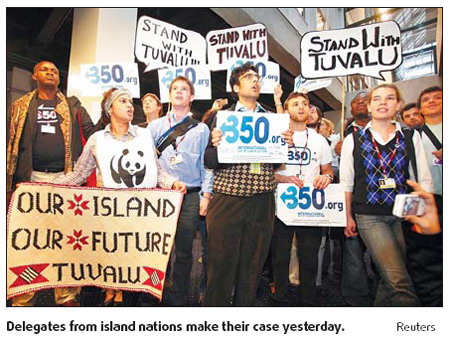Green China
China asks rich countries to do 'soul searching'
By Li Xing and Si Tingting (China Daily)
Updated: 2009-12-11 08:16
 |
Large Medium Small |
COPENHAGEN: China's climate ambassador cited a six-word Chinese idiom three times at a press conference Thursday to ask developed countries to honor their commitment to assist developing nations fight global warming.
Yan bi xin, xing bi guo: Promise must be kept (honored); actions must be resolute, Yu Qingtai said.

Rich countries should abide by promises made a decade ago to cut emissions and provide green technology and financing to developing nations, he said.
Developed countries are required by 2000 to lower emissions to levels that existed in 1990, according to the United Nations Framework Convention on Climate Change.
"Almost a decade has passed, as we all know, and hardly any developed countries have fulfilled their commitment," he said.
He went as far as saying that developed nations should apologize for their lack of commitment.
"(Developed countries) should do some soul-searching," he said in English.
Developed countries should demonstrate enough political will to abide by the UN climate change framework and the Kyoto Protocol to push for substantive progress at Copenhagen, he said.
"The United States accepts its historical role in greenhouse gas emissions, but it is wrong to talk about fault and debt," Stern said. "We want the strongest possible agreement in Copenhagen, but it cannot be a free round for China and the big developing countries."
Yu said Stern is steering focus away from the US' responsibilities and onto China. Yu said China has no intention of being the first candidate for financial aids.
"China has never thought about accepting aid and China has done a lot even without any aid," he said.
The focus at the Copenhagen negotiations should be on how developed countries can fulfill their commitment on emissions reductions and provide technological and financial help, said Yang Fuqiang, director of global climate change solutions at WWF.
"Some Western media are hoping to see China in an uneasy position, as they believe that by putting the spotlight on China, the country would promise even further emissions reductions," Yang said. The WWF official said that China should actually be applauded for their emissions reduction commitment.
"Rich countries have failed to provide financing to poor and vulnerable countries. We believe it is not aid but their debt to poor countries in the amount of $200 billion," said Vibe Jensen, member of Act!onaid, which led a small campaign outside the COP15 conference center with a banner that read: "Rich countries pay your climate debt".
On small island countries
An unusual split within developing countries arose yesterday. Small island states and their supporters want a new legally binding protocol to run concurrently with the Kyoto Protocol, which they say does not do enough for countries most vulnerable to the consequences of global warming.
This contingency demands a new treaty to aim at a maximum global warming of 1.5C, rather than the current 2C. They also want greenhouse gas concentrations stabilized at 350 parts per million (ppm) rather than the 450ppm favored by developed countries and some major developing nations, such as China, India and Brazil.
Jotham Napat, head of the Vanuatu delegation, the most hurricane-prone country in the South Pacific, told China Daly that he wished to see the major developing countries cut more emissions.
"I hope we can come to a consensus in the coming eight days, but it seems to be very difficult," he said.
"China has consistently supported the concerns of vulnerable countries, island countries and least developed countries," Yu said.
He claimed China urged developed countries to make up for their past emissions not out of its own environmental concern but to enforce the UN framework convention.
Yang said it would take a long time to draft another climate document, citing how it took 7 to 9 years to draw up the Kyoto Protocol. "It will be a major distraction to our efforts in the current negotiations," he said.













